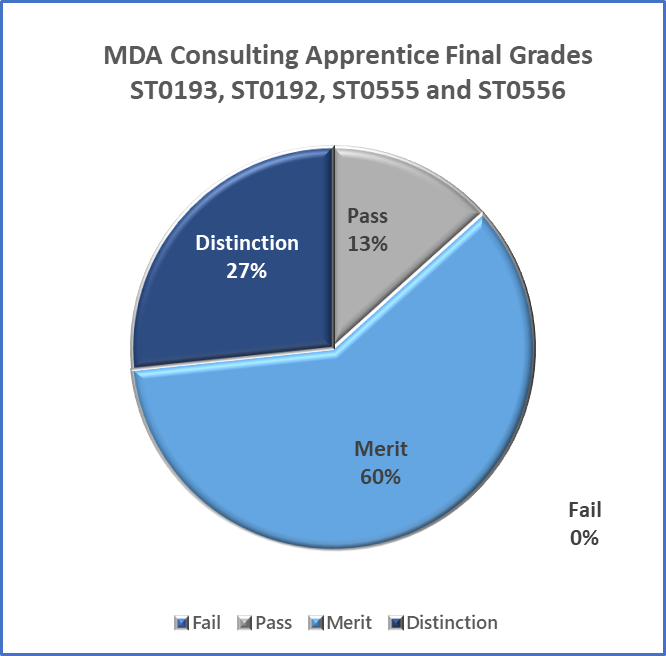

Feedback from the regulator and our apprentices
As apprentice training providers, we are regulated by Ofsted.
Michael D Akers Consulting, which is a wholly-owned subsidiary of Advanced Analytics Solutions, received its initial monitoring visit on November 16 and 17, 2022. We were evaluated in three categories (meeting the requirements of apprenticeship provision, training that leads to positive apprentice outcomes and safeguarding arrangements) on a marking scale with three levels (insufficient progress, reasonable progress or significant progress). We reproduce below the full text of the Ofsted report, which was published on January 4, 2023:
Monitoring visit: main findings
Michael D Akers Management Consulting is an independent provider. It is a business consultancy specialist which offer standards apprenticeships from level 3 to level 6. Apprentices study improvement technician, improvement practitioner, improvement specialist and improvement leader. They also run end point assessments for these apprenticeship standards, though not for the same employers. At the time of the inspection, there were 21 adult apprentices, of whom 10 studied level 4 improvement practitioner, eight studied level 5 improvement specialist and three studied level 6 improvement leader apprenticeship. There were no apprentices in receipt of high needs funding, and they did not work with any subcontractors.
How much progress have leaders made in ensuring that the provider is meeting all the requirements of successful apprenticeship provision? – Rating: Reasonable progress
Leaders have developed a curriculum that is ambitious and responsive to employers who look for ways to improve their businesses. They work closely with employers to tailor and sequence the apprenticeships to support their specific skills and business needs. For example, leaders have designed the curriculum to include a variety of activities and topics, such as leadership workshops, projects on emerging business challenges, or management units that drive improvements in business processes. As a result, leaders ensure that courses meet the bespoke needs of their employers’ industry. Highly qualified trainers have extensive and current industry experience in business and management improvement sector areas. Leaders support trainers to keep up to date with teaching and assessing practices through links with universities, where they teach degrees and take part in research activities. Consequently, apprentices benefit from high-quality, relevant and industry standard training.
Leaders ensure that programmes abide by the principles and requirements of apprenticeship standards. They make sure all apprentices receive their entitlement to off the job training. They check that employers understand their responsibilities for apprentices’ final assessments. As a result, apprentices receive a well-developed and relevant training programme.
Managers have strong governance in place. Suitably skilled and experienced governors support leaders to keep their curriculum relevant to industry and to stay compliant with apprenticeship regulations. This ensures managers have an independent advice that enhances their training content and bring about benefits for apprentices’ skills experiences.
Managers have a reasonable understanding of the quality of their apprenticeship provision. However, they only review their practices in response to requests or comments by employers or apprentices. Managers do not continuously review the quality of the training to assure themselves that apprentices receive high-quality teaching and assessment.
What progress have leaders and managers made in ensuring that apprentices benefit from high quality training that leads to positive outcomes for apprentices? – Rating: Significant progress
Apprentices develop new knowledge, skills and professional behaviours as a result of well-structured and effectively sequenced on- and off-the-job training. For example, apprentices learn about lean techniques and data science that supports their critical thinking skills when reviewing employers’ systems for improvement. Consequently, apprentices develop high-quality skills quickly and produce work of a consistently high standard.
Leaders and managers recruit apprentices with integrity. They assess apprentices’ starting points accurately to ensure that apprentices are on the right course. As a result, apprentices develop the right knowledge, skills and behaviours they need for their roles quickly, and so become better at their jobs. Trainers sequence training in relation to apprentices’ roles and aspirations, which helps apprentices to feel confident about their career opportunities and progression prospects. For example, apprentices’ projects are influenced by the new role they are aspiring for to evidence higher skills and wider knowledge. Consequently, many apprentices progress to senior departmental roles as a result of their training. Trainers promote apprentices’ literacy and numeracy skills well. Trainers add helpful comments to presentations and other work to support apprentices. As a result, apprentices make good progress. Those who require functional skills qualifications receive additional useful coaching sessions so that a large majority of apprentices achieve very well in these qualifications.
Trainers ensure apprentices understand and recall knowledge and skills learned successfully. As a result, apprentices are able to use a range of analytical techniques effectively. They can present information in a professional manner to senior colleagues and demonstrate an increasing good level of detail and reflection in later coursework. Consequently, apprentices develop independence and confidence as the course progress.
Managers prepare apprentices well for their final assessment through informative sessions. They help apprentices understand how to achieve high grades through a wide range of supportive preparatory activities such as practice tests, discussions, and practical projects. As a result, apprentices feel well prepared for their apprenticeship end point assessments. This has a positive impact on the apprentices’ overall results.
Trainers complete comprehensive checks on apprentices’ knowledge and understanding. They give clear, detailed and timely feedback that encourages, challenges and extends apprentices’ knowledge, skills and professional behaviour.
For example, trainers identify misconceptions through a range of in-class activities, including brief ‘teach back’ group presentations. As a result, apprentices make rapid progress and quickly become more competent.
How much progress have leaders and managers made in ensuring that effective safeguarding arrangements are in place? – Rating: Significant progress
Leaders and trainers have created a culture of safeguarding and protection very successfully. Leaders ensure that all staff are appropriately trained so that they have an excellent in-depth understanding of their roles and duties. Leaders work closely and proactively with external safeguarding organisations to report any concerns, and so have a very detailed understanding of local risks and threats. They use this information effectively to keep apprentices safe. For example, leaders work closely with the local police in relation to any local radicalisation groups that may influence their apprentices.
Apprentices feel safe and are confident with the support they receive. Managers and trainers ensure apprentices are very well informed with up-to-date locally and nationally relevant topics, like British Values, prevent and extremism. For example, trainers review topics such domestic abuse. Subsequently, apprentices take part in healthy debates, experience and promote tolerance among each other, and raise their awareness of sensitive matters.
Managers ensure apprentices are aware of employers’ health and safety expectations, and check that apprentices receive regular updates that maintain safe working environments. As a result, apprentices feel safe at work.

As of February 2024, all our apprentices who had taken their End Point Assessment had earned the qualification they set out to achieve. We are delighted to say that 87% of our Apprentices so far have achieved a Merit or Distinction.
A number of our apprentices have gone on to receive a promotion or favourable career move at their employer.
Our most recent testimonials:
“I have completed the level 4 apprenticeship in Lean Six Sigma with David at Advanced Analytics Solutions. I have thoroughly enjoyed the course, the supporting material, the training and the knowledge I have gained along the way. There were some small delays for my project, however David was always understanding and encouraging. He supported me throughout and was a huge factor in me achieving a distinction. I look forward to future projects and the opportunity to demonstrate my skills to senior managers of FK. Thank you!”
– Allie Walker, Fresenius Kabi
“I started my apprenticeship journey on the L4 course whilst working in one firm, and ended it on an L5 course whilst working for a different firm after a career boosting job move. Throughout this, David was absolutely fantastic. Not only did he share his wealth of knowledge with the class in a really engaging way, but he always made sure to give me a few little nudges along the way (that I didn’t know I needed). In addition, he provided a safe environment to ask questions, challenge ideas, and ‘get things wrong’, and every bit of feedback that I had was constructive. David was perfect in adapting his style to suit both my needs and my circumstances, and I thoroughly believe that I wouldn’t have achieved both my grade and my new job without his support.
The course in itself is engaging and worthwhile, but it’s David’s gift to make it come to life in a practical and relatable way that I really want to endorse. I hold undergrad and postgrad qualifications, and I can honestly say that my training with David far surpasses my previous academic experiences in terms of practicability and support.”
– Jodie McIlwain, Fresenius Kabi
“I completed my L6 Improvement Leader Apprenticeship in 2023 with a merit. All my thanks go to Mike & David, who expertly trained and coached me through to success. Their knowledge of the methodologies, the apprenticeship requirements and how and when to apply the various techniques and tools are unsurpassed. Just when I thought I had reached a pretty good level of understanding in a subject, David would introduce another gem of background information. There are a lot of Lean Six Sigma trainers out there who simply teach the tools and students qualify without any real experience or idea of how to apply methodologies or pick the right tool for the job. Advanced Analytics Solutions have left my students and project leaders with the knowledge and confidence to deliver real value to our business.”
– Rob Menzies, Fresenius Kabi
“I have completed the level 5 apprenticeship in Lean Six Sigma with Advanced Analytics Solutions, their material was very engaging and supportive for my specific needs. The tools learned on this course have supported me in improving my team efficiency, and support others in their pursue of continuous improvement. I have learned unique skills to boost my career to a new level by learning new techniques to showcase my achievements to the executive team.”
– Sofia Marques, Fresenius Kabi
“Being introduced to Lean/Six Sigma has 100% changed my life by totally changing my mindset in how to approach improvement ideas and giving me the springboard to be successful in applying to become a team leader. I look forward to increasing my own knowledge going forward and giving others the opportunities that I have been able to take advantage of and help foster a continuous improvement culture within FK.”
– Ryan Hopwood, Fresenius Kabi
“I have thoroughly enjoyed my apprenticeship and I have learnt a lot of new skills along the way which I cannot wait to put into practice. From start to finish the support from the training provider has been first class both during face to face sessions and also via remote learning. The knowledge and expertise of the trainers was excellent and the training sessions that were delivered were really enjoyable. The time and effort put into supporting me leading up to the end point assessment was invaluable and was very much appreciated. Thanks a lot to everyone involved.”
– Rob Cully, Fresenius Kabi
“MDA Consulting made the journey through my Level 4 Improvement Practitioner qualification very enjoyable. Every aspect of the training was aimed at providing me with the tools and information needed to fully understand the Lean Six Sigma principles. There were times when things got on top of me but the trainer was always available to put my mind at rest and I believe this caring approach played a huge part in helping me achieve a distinction.
Gaining this qualification has enable me to push on within my role as Continuous Improvement Lead and give me the confidence, knowledge and tools to highlight significant improvements within my workplace”
– Rob Currie, Fresenius Kabi
